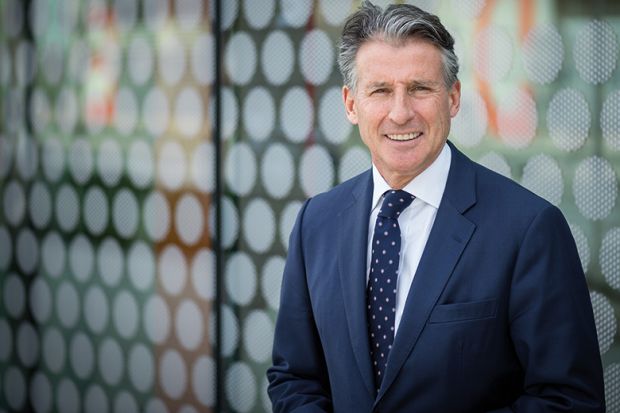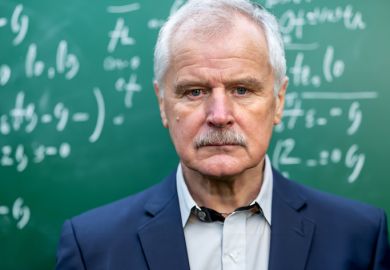Lord Sebastian Coe is a former middle-distance runner and Conservative politician. He won gold medals in the 1,500 metres at the 1980 and 1984 Olympic Games, and was MP for Falmouth and Camborne from 1992 to 1997. He was the head of London’s 2012 Olympic Games bid and is the president of the International Association of Athletics Federations (IAAF). He is currently senior pro-chancellor and chair of Council at Loughborough University, his alma mater. In March, he was appointed chancellor, a position that he takes up in July.
Where and when were you born?
West London, 1956. My father was a manufacturing engineer, my mum an actor and, just in the way that manufacturing engineers tended to drift, they went north.
How has this shaped you?
My formative years were spent in South Yorkshire. It’s quite a unique county. I remember arriving in Cornwall as a [parliamentary] candidate and being told by one of the locals that they’d never vote for an outsider because they didn’t like them. I told them not to worry, and that I was brought up in a county where they’re not that fond of each other on the best of days. I love Yorkshire and it was probably being brought up [there] that made me drift towards a Cornish constituency. I like individuality and felt very much emotionally anchored there.
What role did higher education play in bringing you to this point in your career?
It helped me move out of my comfort zone. Where Loughborough really helped to shape me was during my athletics career. I arrived as a junior international and the year that I graduated, I broke three world records. I graduated as an athlete.
How important are universities in cultivating the UK’s best sportsmen and women?
Hugely important and not just in terms of great coaching. The application of science – physiology, biomechanics, anatomy, the ability to understand when athletes need periods of rest and recovery, and the ability to predict causality/probability around injury – all these things are now on a completely different landscape compared with when I arrived at Loughborough. When I got there, we had only a cinder track and my coach, in order to illuminate the track because there were no floodlights, [provided us] with a modicum of light by turning on his car headlights.
What do you view as your most important task as chancellor?
I genuinely enjoy the company of students. Recently, I’ve spent almost as much time at the London campus as I have at the East Midlands campus. I don’t want to get too far away from student life because I think that it’s really important. I’ve got two boys at university, my daughter went, and my youngest is probably heading there too – I’m sweating over her A levels at the moment – and it’s important to understand the motivations, fears and ambitions of students. The other thing that I can probably help with as chancellor is driving Loughborough’s international reputation.
Are you concerned for the future reputation of athletics if the authorities don’t get a handle on corruption?
I’ve spent the past couple of years putting governance into sport and we’ve made some profound changes in creating governance and ethical compliance. It’s important that we get on top of this but it’s not our biggest challenge. The biggest challenge in athletics is remaining relevant and exciting to young people and looking – as a sport – like the world that they live in. Athletics is a sport that is 50 per cent gender-balanced on the field and yet we don’t have anywhere near enough women coming through to take up senior roles in the sport, for example, in the areas of coaching and federation management. By the time I’ve done my stint [at the IAAF], I want the sport to be gender-balanced across all its structures.
What kind of undergraduate were you?
Pretty crap, really. I was trying to balance everything with two or three training sessions a day. I had a history tutor who said, charitably but with a slight snarl, that I was the only student who regularly handed in essays on British Airways notepaper. I slithered my way through.
What brings you comfort?
The innate goodness that emerges through mankind and sport.
What saddens you?
Talent that is left dormant because there isn’t any framework for ambition. I think that it’s the litmus test of any country. [Countries should do] everything that they can to help unearth talent.
What keeps you awake at night?
The one thing that I taught myself to do in sport was to sleep pretty well. In fact, I sleep so well that I had to be woken up perilously close to a European final once. I left myself 20 minutes to warm up.
If you were universities minister for a day, what policy would you introduce?
I would make sure that governments of all political persuasions recognise the importance of making it easier for overseas students to come and study in this country. It’s the best investment that a country can make, establishing connections with smart people who’ll go back to their communities and have an affinity – whether socially, culturally or politically – for what you and your nation stand for. I was quite moved by the conversations I had with overseas students during my first graduation ceremony at Loughborough’s campus in London, [and was] struck by how difficult it is for many of them to stay and contribute to our economy. It’s so short-sighted for a nation that is seeking to be open and inclusive [not to] absorb the best brains from wherever it can.
What would you like to be remembered for?
I’m not bothered! That’s for other people to decide.
john.elmes@timeshighereducation.com
Appointments
Sharon F. Matusik has been appointed dean of the University of Colorado Boulder’s Leeds School of Business. Professor Matusik, who has been the school’s interim dean since January, took up her position at the beginning of June. Previously, Professor Matusik served as senior associate dean for faculty and research at the university and has sat on the board of organisations such as the Strategic Management Society and the National Association of Women MBAs (formerly Graduate Women in Business). “I have enjoyed working with our students, faculty, staff and the business community over the past 13 years as a faculty member and over the past few months in my role as interim dean, and I look forward to deepening those relationships to drive Leeds forward,” she said.
Peter Rathjen is to return to the University of Adelaide as its new vice-chancellor and president. Professor Rathjen, who previously was foundation executive dean in Adelaide’s Faculty of Sciences,
is currently the vice-chancellor of the University of Tasmania. An internationally renowned genetics and stem cell researcher, he will take up the role in early 2018. “I am excited at the opportunity to return to Adelaide, which has been a formative part of my own personal story,” he said. “It was from the University of Adelaide that I graduated with my first degree, and where I held my first research and leadership roles. The University of Adelaide has a track record of consistent success in research, innovation, engagement and teaching.”
Robert Klose has taken up his position as professor of genetics in the department of biochemistry at the University of Oxford. Alain George and Yaacov Yadgar are also joining Oxford in August, as Ieoh Ming Pei professor of Islamic art and architecture and Stanley Lewis professor of Israel studies, respectively.
Paul de Jong has been appointed director of the Institute of Physics at the University of Amsterdam.
POSTSCRIPT:
Print headline: HE & me
Register to continue
Why register?
- Registration is free and only takes a moment
- Once registered, you can read 3 articles a month
- Sign up for our newsletter
Subscribe
Or subscribe for unlimited access to:
- Unlimited access to news, views, insights & reviews
- Digital editions
- Digital access to THE’s university and college rankings analysis
Already registered or a current subscriber? Login







